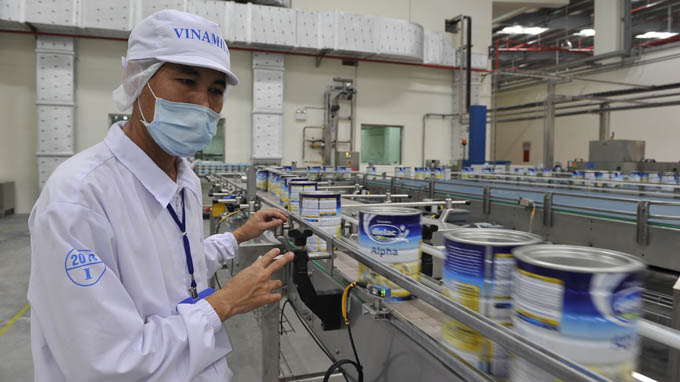There will be massive divestment of state capital from state-owned enterprises (SOEs) via equitization in the future, said a senior state official.
But the equitization will only be carried out at the most favorable time, based on market conditions, so that it achieves the best efficiency and the state can recover as much capital as possible, said Pham Viet Muon - Deputy Chairman of the Government Office.
It is not true that the government has not overlooked state capital in the form of dividends paid for the state-owned shares in partially-equitized firms, as Tuoi Tre has reported, said Muon, also the permanent deputy head of the National Steering Committee for Enterprise Reform and Development.
According to Resolutions No. 3, drawn from the 9th National Congress of the Communist Party of Vietnam, the proceeds from the sale of shares have to be used for the implementation of welfare policies for State employees and for reinvestment in those businesses.
From this policy, the Government and the Prime Minister have issued many legal documents for implementation.
Specifically, there are regulations that state capital proceeds in SOEs and dividends from state-owned capital in SOEs after equitization must be managed closely and effectively.
The above amount must be paid on many state-run funds.
If the equitization takes place at SOEs’ subsidiary companies, the proceeds are returned to a fund used for the restructuring of those mother SOEs. If the equitization happens to independent SOEs, the proceeds will go to another fund used for the same purpose under the management of the State Capital Investment Corporation (SCIC), he said.
Regarding the question of how those funds are used, Muon said the equitization process has helped divest 16 percent of state capital at those SOEs. Among the money received from the divestment, some VND8.7 trillion has been spent on welfares policies for 25,000 redundant workers.
The funds have also been used as additional capital for the parent SOEs or additional investments to maintain or increase the rate of the state capital in other SOEs.
In response to the thought that such additional capital used to increase charter capital at SOEs is needed but should be limited, Muon said without it, big SOEs don’t have enough capital sources for reinvestment and expansion.
“Take PetroVietnam as an example, if it is required to do that, it has nothing to reinvest. Every year, they need to invest tens of trillions of dong for exploring and tapping new oilfields as the old ones cannot be exploited forever.”
“Another example is Vinacomin, which has to dig 300km of new mines, which is equal to the distance from Hanoi to Nghe An. Every kilometer of new mine needs huge investment, so without the reinvestment money, they will have to borrow from banks, thus raising the input costs.”
Regarding the fact that the State still holds the majority share in many companies which are not operating in key sectors, even though it shouldn’t be, Muon said the divestment process will take a little more time.
“Three times the government has listed out many criteria to classify those SOEs, and this will continue to modify and supplement existing regulations towards narrowing the field of business in which the State holds dominant shares.”
“As to why the equitzation process has not gone well recently, the answer is closely related to the market conditions.”
“The equitzation process was very high in previous years, such as from 2006-2007, with 700-800 companies equitized each year, while in the current market conditions, it is difficult to run the equitzation of even 30 companies annually. The government is trying to bring the number of equitized SOEs in 2013 to 50.”
“The Prime Minister also stated very clearly that relevant state agencies have to roll up their sleeves in continuing to sell stake in SOEs that have already been equitized. Those firms are operating in areas that the State does not need to hold dominant shares in.”
“At the same time, the Prime Minister has also asked the People's Committees of provinces and cities, big state-run corporations and state-owned companies to map out detailed plans on further equitation and divestment under the provisions of law and market conditions to ensure the sale of State capital in those enterprises effectively.”
In a draft decree recently announced by the Ministry of Planning and Investment, the state will hold at most 75 percent capital in big firms like PetroVietnam, Vinacomin and EVN. Muon said it is impossible to do this by 2015.
“The divestment at big SOEs like PetroVietnam, Vinacomin, EVN, Vietnam Rubber Group, Viettel, and VNPT could not be done at that time at those industries are too important for the national economy.”
As scheduled, the process will take place at others like the Vietnam Steel Corporation, VietNam Paper Corporation (VINAPACO), Vietnam Airlines, and The Vietnam National Textile and Garment Group (Vinatex).”
Regarding the attraction of foreign investors into the process, Muon told Tuoi Tre that foreign investors are primarily interested in the profitability of their investment capital, should they choose and consider very carefully before investing in the stocks of specific businesses.
“I have repeatedly joined local companies in introducing and attracting foreign investment to sell shares to strategic investors, and find out what the profit from each dollar of investment will be.”
“Relevant ministries told me that the equitization plans have been approved, but there were no buyers when they brought the stocks to the market,” he added.



















































